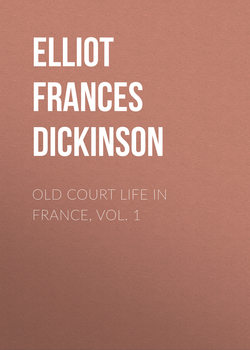Читать книгу Old Court Life in France, vol. 1 - Elliot Frances Minto Dickinson - Страница 3
PREFACE TO THE THIRD EDITION – IN REPLY TO CERTAIN CRITICS
ОглавлениеTO relate the “Court life” of France – from Francis I. to Louis XIV. – it is necessary to relate, also, the history of the royal favourites. They ruled both court and state, if they did not preside at the council. The caprice of these ladies was, actually, “the Pivot on which French history turned.”
Louis XIII. was an exception. Under him Cardinal Richelieu reigned. Richelieu’s “zeal” for France led him unfortunately to butcher all his political and personal opponents. He ruled France, axe in hand. It was an easy way to absolute power.
Cardinal Mazarin found France in a state of anarchy. The throne was threatened with far more serious dangers than under Richelieu. To feudal chiefs were joined royal princes. The great Condé led the Spanish troops against his countrymen. Yet no political murder stains the name of the gentle Italian. He triumphed by statescraft, – and married the Infanta to Louis XIV.
Cardinal de Retz possessed much of the genius of Richelieu. No cruelty, however, attaches to his memory. But De Retz was on the wrong side, the side of rebellion. He was false to his king and to France. Great as were his gifts, he fell before the persevering loyalty of Mazarin.[Pg ]
The personal morality of either of these statesmen ill bears investigation. Marion de l’Orme was the mistress and the spy of Richelieu; Mazarin – it is to be hoped – was privately married to the Queen Regent Anne of Austria. Cardinal de Retz had, as a contemporary remarks, “a bevy of mistresses.”
We have the authority of Charlotte de Bavière, second wife of Phillippe Duc d’Orléans, brother of Louis XIV., in her Autobiographical Fragments, “that her predecessor, Henrietta of England, was poisoned.” No legal investigation was ever made as to the cause of her sudden death. There is no proof “that Louis XIV. disbelieved she was poisoned.”
The number of the victims of the St. Bartholomew-massacre is stated by Sully to have been 70,000. (Memoirs, book I., page 37.) Sully and other authorities state “that Charles IX., at his death, manifested by his transports and his tears the sorrow he felt for what he had done.” Further, “that when dying he sent for Henry of Navarre, in whom alone he found faith and honour.” (Sully, book I., page 42.)
That Sorbin, confessor to Charles IX., should have denied this is perfectly natural. Henry of Navarre would stink in the confessor’s nostrils as a pestilent heretic. As to the credibility of Sorbin (a bigot and a controversialist), I would refer to the Mémoires de l’état de France sous Charles IX., vol. 3, page 267.
According to the Confession de Saucy, Sorbin de St. Foy “was made a Bishop for having placed Charles IX. among the Martyrs.”
Frances (Minto) Elliot.
August, 1873.
